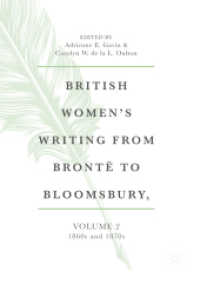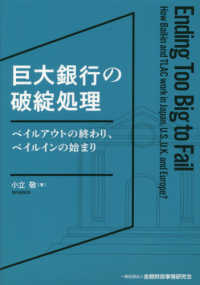Full Description
Drawing together international experts on research methods in International Relations (IR), this Handbook answers the complex practical questions for those approaching a new research topic for the first time. Innovative in its approach, it considers the art of IR research as well as the science, offering diverse perspectives on current research methods and emerging developments in the field.
Empirical chapters are split into five distinct parts guiding the reader through the research process, covering the key topics including scope and methods, concepts, data and techniques and tools and applications. Highlighting the wide-ranging differences in the topic, the illustrative case studies and research models also provide guidance on how and when to use these tools, including how to evaluate research at the start and end of projects. Furthermore, it examines how to publish research and provides advice on how to manage a research team.
This informative read will provide an excellent resource for established researchers taking on new projects, rethinking their approach to IR or those interested in learning new methods. Students and scholars of international politics and public policy as well as social scientists will also find this illuminating and instructive.
Contents
Contents:
Introduction: international relations as interdisciplinary research 1
R. Joseph Huddleston, Thomas Jamieson, and Patrick James
PART I INTERNATIONAL RELATIONS: SCOPE AND METHODS
1 Doing international relations 7
Ross James Gildea and Andrea Ruggeri
2 Epistemology: logic, causality, and explanation 25
Simon Frankel Pratt
3 Critical approaches 41
Leigh Spanner
4 Conceptualization, measurement, and data 63
Jenifer Whitten-Woodring
5 Historical methods 74
Norrin M. Ripsman
6 Systems analysis: systemism and the Visual International Relations Project 89
Sarah Gansen and Patrick James
PART II APPROACHES: EXPLAINING INTERACTIONS
7 International relations and regime type 105
Inken von Borzyskowski and Mert Kartal
8 International organizations and world politics 140
George Kyris
9 State and non-state actors in world politics 155
Efe Tokdemir and Seden Akcinaroglu
10 International regime complexes 171
Mark Raymond
11 International (global) political economy 186
Lui Hebron
12 Feminist methods in international relations research 202
Melissa Johnston
PART III GETTING STARTED WITH RESEARCH: CONCEPTS,
DATA, AND TECHNIQUES
13 Using theory to choose an empirical research strategy 221
Emily Hencken Ritter
14 What kind of data is appropriate for my question? Choosing a unit of analysis 245
Elsy Gonzalez and Paul Poast
15 Choose your own estimator (or perish trying) 259
Christopher K. Butler and Weidong Zhang
16 Causal pathway analysis and matching: a practical guide 271
Jeb Barnes and Nicholas Weller
17 Challenges and payoffs of building a dataset from scratch 288
Jessica Maves Braithwaite
18 Think locally, regress globally: making the most of conventional IR data 305
Carlos Felipe Balcazar and Matt Malis
19 Non-state actors, civil wars, and other units of analysis 329
Michael A. Rubin
20 Text as data 350
Peter B. Cuppernull and Rochelle Layla Terman
21 Big data 370
Eric Min
22 Political research with social media data 392
Samuel E. Bestvater
23 Dealing with missing and incomplete data 413
Miriam Barnum
PART IV RESEARCH TOOLS AND APPLICATIONS
24 Regression analysis 435
Giacomo Chiozza
25 Survival analysis in international relations 456
Myriam Shiran and Patrick E. Shea
26 Network analysis 477
Elizabeth J. Menninga and Lindsey A. Goldberg
27 Formal theory: an informal discussion 495
Julianne Phillips
28 A brief glance into qualitative methods for international relations 517
Reyna L. Reyes Nunez
29 Planning, conducting, and analyzing interviews 536
M.P. Broache
30 Mixed methods research 558
Dana El Kurd
31 Digging through documents: the promise, problems, and prospects of
archival research for international relations 571
Joshua Shifrinson
32 Qualitative comparative analysis (QCA) 595
Alrik Thiem
33 Interpretivism in international relations research 617
Lucas Knotter
34 Case study analysis 639
Luai Ali
PART V EVALUATION AND RELEVANCE OF RESEARCH RESULTS
35 The political and policy relevance of our research 657
Bridget L. Coggins
36 How to publish in academic journals 679
Marijke Breuning and John Ishiyama
37 Navigating the ethics of human subjects research 696
Jennifer Roglà
38 Research labs: concept, utility, and application 717
Kelebogile Zvobgo
39 Perverse effects, potential harms, and international relations research in
the world 736
Laura Sjoberg and Jonathon Whooley
Index








